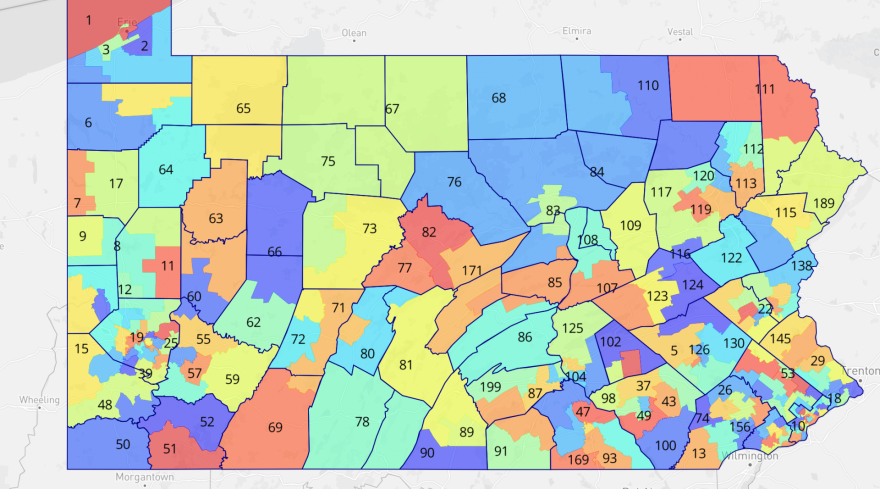Pennsylvania citizen groups are celebrating what will likely be the first narrowly-divided state House of Representatives in more than a decade — and they’re giving newly-drawn state political maps part of the credit.
Analysts predicted that under new maps installed earlier this year, elections would be way more competitive than they had been in the last decade. Republicans dominated the lower chamber in that time – but Democrats now have a real chance of taking control.
Based on the way a special legislative commission drew borders earlier this year, Democrats had the advantage in 20 more House districts than last decade. About 40 more seats were considered up for grabs.
So far, Dems have picked up 11 seats, while the GOP has shed the 25-seat majority it once held. Two races in Bucks and Montgomery counties that remained undecided Friday evening could grow that tally. In the end, control of the House could be determined by a single seat.
Carol Kuniholm of non-partisan good government group Fair Districts PA said all of that was made possible by the new maps, which redistributed power in a way she feels is more even.
“It’s an appropriate outcome, given the electoral makeup of Pennsylvania,” Kuniholm said. “With a map that reflects the population more evenly, there’s the possibility that everybody’s voice will be heard, that everybody’s concerns will be heard, and that we will be represented more fairly.”
Of the 8.8 million voters in Pennsylvania, just over four million are registered Democrats, 3.4 million are Republicans, and more than a million are affiliated with a different party or none at all.
Kuniholm added the GOP has been able to ignore the opposite party when making policy decisions: only a handful of bills that passed both chambers in the last session were sponsored by Democrats.
“We’ve been watching that really toxic dynamic in our state legislature, and we would suggest to leadership to rethink that as they start this next session,” she said. “Both sides should think about how to make the legislative process work for everybody instead of shutting half of the population of Pennsylvania out completely.”
Though conventional political wisdom says few things are accomplished when a divided government is in power, Susan Gobreski of the League of Women Voters disagrees.
“When people have to compete for support from the public, I think that that means that the public is more likely to get positive policies,” she said. “People agree about much more than they disagree.”
There’s plenty to work on, Gobreski adds: election law changes to make it easier for people to vote, for instance. House Democrats suggested in a press conference Thursday that one such change would be possible if they end up taking control: allowing counties to process mail-in ballots before the morning of an election.
“Our counties in a bipartisan way have asked for the ability to start opening ballots and counting ballots in a way that is done in almost every other state,” Rep. Matt Bradford (D-Montgomery) said. “Let’s get that done on Day One.”
Voters across the state have a long wish list of priorities as well. One member of WITF’s Capitol News Chatter text club says lawmakers should work on increasing public school funding and improving litter control policies. Another said it should be easier for businesses to obtain permits, and cost less for them to obtain health insurance for their employees.
Above all, Gobreski said, citizen groups are pushing for legislative leaders to write even-handed internal rules come January. At the start of each session, the majority party gets to write rules about how committees are structured, how and when debates can be held, and more.
It’d be tempting for leaders to write those rules so they’re beneficial to their own party — but Gobreski says they’d be better off collaborating.
“We want to make sure that a few individuals don’t have near total control over the [legislative] process,” she said.
“If you know that the rules you make today are going to be enforced by the other side tomorrow, you might want those rules to be really even-handed,” Kuniholm added.
Once the new session gavels in next January, Republicans may initially control the chamber no matter the outcome of the two undecided races.
Three Democratic seats will technically be vacant: Summer Lee and Austin Davis won higher office this month – while Tony DeLuca died earlier this month. Dems are talking about bringing Lee and Davis back to the chamber to vote on the next Speaker of the House.




